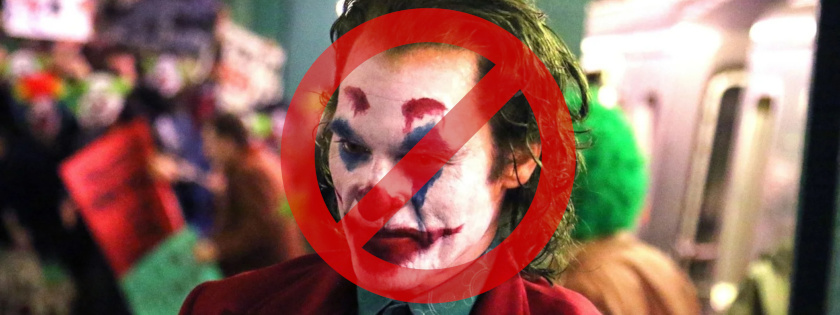From an ill-conceived idea to an apparent ideological quagmire troublingly in tune with the times it was released in, the Joker movie is polarizing for the wrong reasons.
Disclaimer: I have not seem the movie and this review is partly based on a couple third-party reviews when it comes to the movie itself. Both articles are linked at the end of this post.
First of all I believe this movie should never have been made. The Joker is an emblematic character of the Batman universe because he embodies chaos, while Batman wants to enforce order at any cost, including breaking the law or being publicly vilified. In this context, the Joker systematically puts him in front of his contradictions and constantly tests his most intimate convictions, including not killing anyone during encounters with baddies. In this fashion the character of the Joker is an extension of Batman; without him, there’s no Joker either. A Joker origins movie doesn’t make much sense without having Batman present, and this opens the door to a lot of undesirable leeway in his representation.
Then there’s the character of the director himself. Known for the Hangover movies, Todd Phillips is one of those frustrated white men who dare say in public that “wokeness killed comedy” and that would be why he wanted to direct a serious movie instead, probably after having received some criticism on Twitter about his humor often frat-like. It is important because apparently the movie adopts a similar point of view of a privileged white man frustrated by society in general.
Joker is supposed to take place in the fictional town of Gotham City, but everything is done to remind New York City circa 1970-1980, whether it is with filming locations, or the carefully chosen cars or accessories to avoid anachronisms. And yet it takes liberties with actual history, rewriting a couple of events that seem to have inspired two violent scenes in the movie.
The first one being the teenage group brutalizing Arthur Fleck reminds of the Central Park jogger case. In 1989, 5 teenagers of color had been accused of raping a jogger in Central Park after a string of assault on passersby the same day. Their trial was expedited even though there wasn’t any material element linking them to the victim. Donald Trump himself asked for the death penalty to be reintroduced in the state against them. They ended up serving 6 to 15 years in jail. Finally, in 2002, another man confessed having raped the jogger, their sentence was annulled and the city ended up paying them damages. The movie seems to side with the people who believed these teenagers guilty, or at least “if it wasn’t them, there were probably others”.
The second one is the subway assault that reminds of the 1984 New York City subway shooting. Bernhard Goetz, a white man, shot 4 black teenagers in a subway car, disabling one. Goetz’ racist public remarks shed doubt on the purported self-defense motive, and yet a jury cleared him of all charges but possession of an unlicensed firearm. In the movie, there’s no doubt about the self-defense motive, and the attackers are white men in suit, erasing all traces of racism from the related event.
Finally, all the interactions between Arthur Fleck and black women are shown as frustrating for him: the woman in the bus with her kid, his neighbor with whom he will invent a romance, and the psychiatrist at the asylum. Two of them even probably end up dead at his hand, although their death isn’t shown, erased until the end.
This movie seems to tell a story, but not the Joker’s, whose ties with the rest of the Batman universe are tenuous at best in this movie. Rather the sadly common story of these white men whose mental illness isn’t correctly addressed, frustrated by society and who decide to let off their anger with guns on any scapegoat they can think of. It is the sad story of Patrick Crusius, Connor Betts, Seth Ator, Santino Legan, Alec McKinney, Trystan Terrell, John Earnest, Zephen Xaver, Dakota Theriot and this is only 2019 in the US. And the chosen angle of glorification of this movie repulses me. One of the main features of the Joker character is that he is always defeated at the end by Batman, even if his character raises interesting philosophical points.
Because even if the criticism of our society shown in this movie was accurate, and I’m giving it the benefit of a massive doubt, the way Arthur Fleck/Joker is leading the charge against it isn’t the right way to remediate to it. No just society is based on tapping into white men’s frustrations. We’ve seen how it turned out in 1933, we don’t need to revisit it.
Sources:
(This article is a translation of a social media comment I wrote in French from Friendica on a Mastodon thread)

